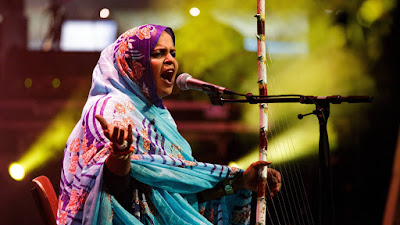Les Rochettes [dansers of Tabu Ley Rochereau & Afrisa International]
1985.Jul.10 in Melkweg Amsterdam
My post about and positive reactions to Africa/World Roots on Milky Way K7s made me dug into my collection. I remembered I had some Africa Roots LPs and guess what, I found Vol.3, the one which does not seem to have been released on K7 [at least nowhere found any audio nor info from such]. So I digitized my own LP, which wasn't so easy and took me more time than expected, because of technical problems.
Anyway I am happy and proud to present to you:
AFRICA-ROOTS-1985_Vol.3 · live A'dam
incl.detail of album cover*, posters and newspaper articles about the 1985 Festival itself
1985, LP, Milkyway Records #F.1014785
TRACKLIST
a1.Les Officiers Of African Music - Helena (7:00)
a2.Les Officiers Of African Music - Rebia (5:10)
a3.Tabu Ley Rochereau - Sanza Misato (6:25)
a4.Tabu Ley Rochereau - Kaful Mayay (3:25)
a5.Somo Somo - Mele (3:25)
b1.Bembeya Jazz - Yekeke (8:10)
b2.Bembeya Jazz - N Kanuwe (6:05)
b3.Kumbi Saleh - Hwan Na Odo Me (7:45)
a1-a2: recorded 1985.Jul.14 at the Melkweg, Amsterdam
a3-a4: recorded 1985.Jul.10 at the Melkweg, Amsterdam
a5: recorded 1985.Jul.11 at the Melkweg, Amsterdam
b1-b3: recorded 1985.Jul.12 at the Melkweg, Amsterdam
LINER NOTES
Since the first AFRICA ROOTS festival [1983] in Amsterdam there has been a growing interest in African popular music. Based on traditional African rhythms and in combination with western techniques a new generation of African bands have developed exciting styles of dance music. Most of them, already successful in Africa, like to present their powerful music-culture to audiences abroad.
-- LES OFFICIERS Of African Music combine the best of the Congolese music-scene in Paris, featuring 'the golden voide' Tchico and masterguitarist Denis Lacloche Their music is a superb mix of soukous and disco ingredients, high energy dance rhythms, which for sure will change your mood.
-- TABU LEY R0CHEREAU is the pioneer of the 'chanson africaine' and Zairean [=Congo] popmusic in general. Still living in Kinshasa, Zaire he now sings all over the world with his band AFRISA INTERNATIONAL - bringing a powerful show of strong soukous dance songs with melting harmonies.
-- SOMO SOMO is the new group of Zairean [=Congo] master guitarplayer/singer/composer MOSE-FAN FAN-SESENGO, who played for seven years with the fámous FRANCO in Africa. Together with the South African female:vocalist Doreen Webster he sings exciting melodies in ihe soukous style of Zaire.
-- BEMBEYA JAZZ is the legendary national orchestra of Guinea, West Africa. From the beginning in 1961 their music has been an essential part of Guinean history. Only recently have they started playing for international audiences. On this very first European live recording we can enjoy their emotional music with the brilliant guitar of Sekou - Diamond Fingers - Diabate.
-- KUMBI SALEH is a band of Ghanaian musicians based in Amsterdam. They present their original highlife music from Ghana for the first time on vinyl, after being extremely successful on different European stages, with a song about the delicate affairs of human affection - who will love me?
Links to videos I found about the 1985 Africa Roots Festival:
- 1985.Jul.10: Les Rochettes [see above, dansers of Tabu Ley Rochereau & Afrisa International] in Melkweg Amsterdam
- 1985.Jul.10: Tabu Ley Rochereau in Melkweg Amsterdam
- 1985.Jul.14: Les Officiers Of African Music in Melkweg Amsterdam
- 1985.Jul.14: Kumbi Saleh at Festival in Vondelpark
*unfortunately, I'm unable to make full scans of the album sleeve, so only the most important part of the backside is included, with tracklist, small pictures and liner notes

